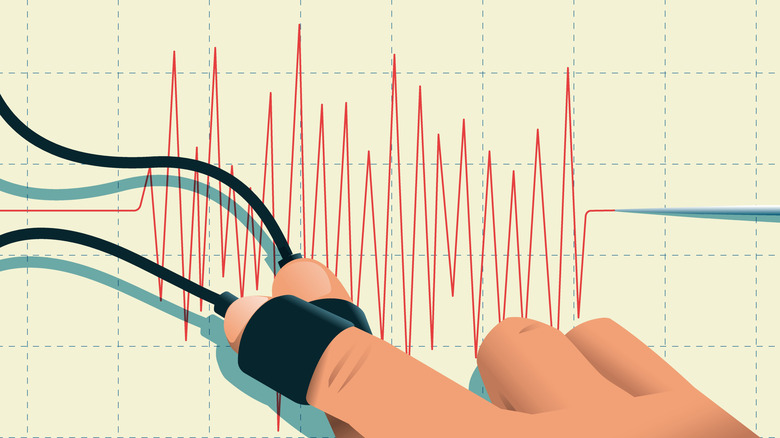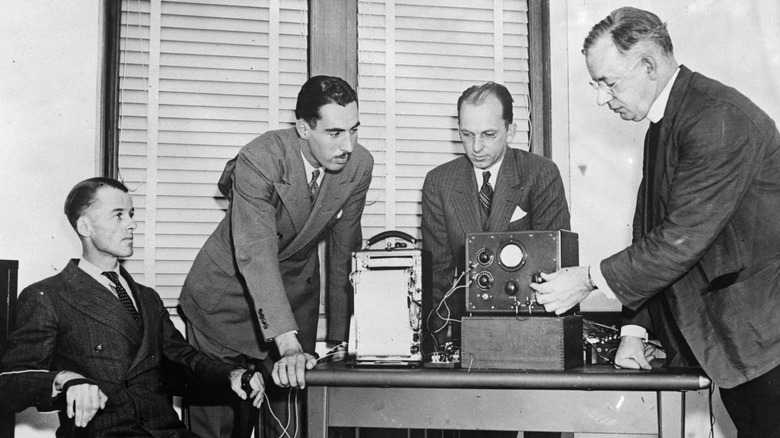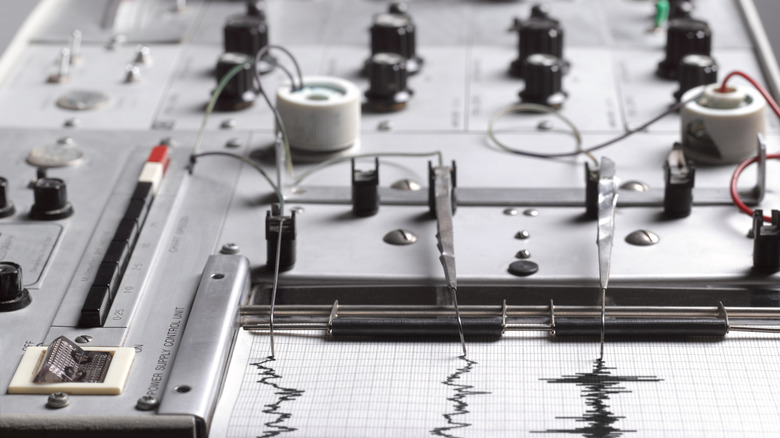Why Lie Detector Tests Aren't As Accurate As You Think
In Season 8, Episode 10 of "The Simpsons" — an episode parodying the popular 1990s sci-fi thriller "The X-Files" — Homer Simpson is being questioned by two federal agents at a police station. "This is a simple lie detector," one of the agents informs him, gesturing toward a machine scribbling away at a piece of paper on a nearby table. "I'll ask you a few yes or no questions, and you just answer truthfully. Do you understand?" "Yes," Homer replies, at which point the lie detector promptly explodes.
It's a classic and enduring comedic bit, and the fact that the show's writers built it around a lie detector machine speaks to how pervasively this method of ascertaining the truth in law enforcement has captured the public imagination. From TV crime dramas to real-life courtrooms and job screenings, polygraph tests, as they're officially known, have often been viewed as reliable arbiters of truth. The idea that a machine can tell whether someone is lying is a compelling one, but the facts about lie detectors are far more complicated. Despite their widespread use over the years, polygraph tests are not nearly as foolproof as their name suggests.
Invented in the early 20th century by several individuals — including the British cardiologist James Mackenzie and the police officer John Augustus Larson — over the course of decades, the polygraph was originally intended to measure physiological changes that were tied to emotional ones. The assumption was simple: the stressful emotions that an individual experienced while lying might manifest as changes in heart rate, blood pressure, and breathing. The idea was so compelling that law enforcement and intelligence agencies adopted the technology in the 1950s, claiming they could root out spies. Ironically, the core principle underpinning the technology turned out to be little more than a lie itself.
The science doesn't lie — but polygraphs might
While the polygraph is often seen as a sophisticated lie detector, it's far more accurate to call it a stress detector. Polygraphs measure physiological signals like blood pressure, heart rate, breathing patterns, and even skin conductivity, all of which can fluctuate under pressure. But here's the catch: those same physiological shifts can happen when someone is nervous, confused, tired, or simply afraid of being disbelieved. What one person might see as a lie during an interrogation might really just be someone not particularly enjoying the experience. Put simply, there is no evidence that these physiological changes uniquely correlate with lying.
This is why polygraphs tend to produce a high rate of false positives, tagging innocent people as liars (and incorrectly giving guilty individuals a pass). A comprehensive 2003 report by the National Research Council found that polygraphs were only marginally better than pure chance in distinguishing truth from deception. Their conclusion was blunt: "Almost a century of research in scientific psychology and physiology provides little basis for the expectation that a polygraph test could have extremely high accuracy."
Real-world examples drive this point home. Aldrich Ames, the infamous CIA officer who spied for the Soviet Union, passed two polygraphs while actively committing espionage. The inefficacy of these tests is so great that in 1988, the U.S. government passed the Employee Polygraph Protection Act, preventing private employers from using polygraphs to screen potential employees. Even more telling, the "evidence" the technology presents has been deemed inadmissible in federal and some state-level courts. Despite this, however, the technology persists in other areas of law enforcement and is even required for certain jobs in the federal government.
The ethics of lie detectors
Despite a lack of scientific consensus on their accuracy, polygraph tests continue to show up in corners of society where the stakes couldn't be higher. Federal agencies like the CIA, FBI, and NSA still require polygraph examinations for applicants and security clearances. In these settings, a failed test can mean the end of a career before it begins. A successful test from someone who is actually lying about their history or qualifications can potentially lead to that person ending up in an agency that directly affects the public's safety. Simply put, the test persists not because it's trusted by scientists, but because it's believed to produce useful psychological pressure as part of the theater of interrogation.
That raises uncomfortable ethical questions. If a tool is more effective as an intimidation device than a diagnostic one, does it have a place in law enforcement at all? Critics argue that the very existence of the polygraph's cultural mythology — the idea that the machine "knows" — can coerce people into revealing things they might not otherwise share. In some cases, innocent individuals have confessed to crimes under the mistaken belief that failing the polygraph proved their guilt.
Despite all of this, the legacy of the lie detector persists, bolstered by Hollywood, tradition, and institutional inertia. Scientists are constantly coming up with radical new technologies that help us peer into our inner worlds, like the incredible map that shows every neuron in the brain and even techniques to help us edit bad memories. But until our policies catch up to the science behind lie detectors and we dispel the idea that there is a magic bullet that can tell us when someone is lying, the polygraph's biggest deception might be our continued faith in it.


